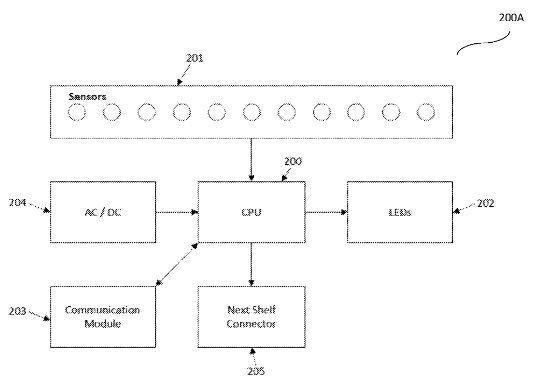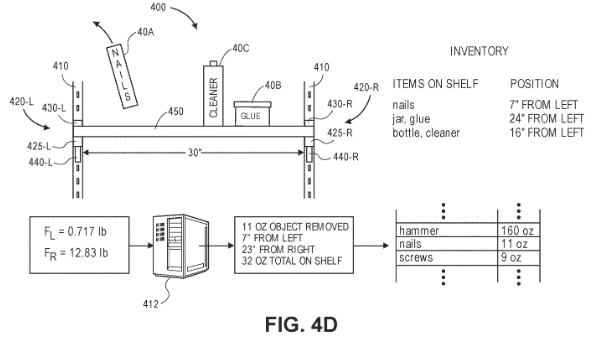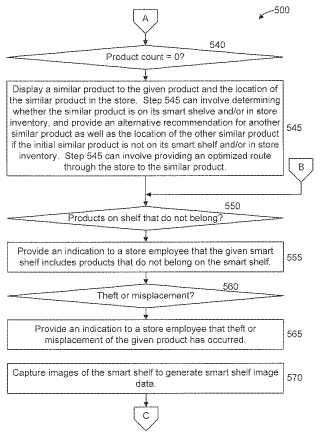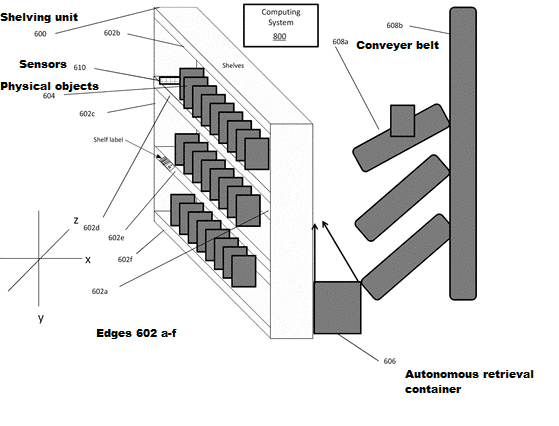Introduction
One of the most promising next-generation retail technology is smart shelves. Smart shelves, which are also known as “intelligent shelves”, are electronically connected shelves which are designed to automatically keep track of inventory in any retail establishment. Manufactures can collect real-time data about their products usage and get sales data. Smart shelves use a combination of sensors, digital displays and RFID tags to provide detailed product information, marketing and cross-selling suggestions, while providing retailers invaluable insights into customer preferences and shopping patterns.
Absence of stock items in retail stores resulting in causing dissatisfaction among the customers is one of the biggest challenges the retail industry is currently facing. Smart shelves technology enables automated tracking of stock availability and informs retail stores if the items are running low or if they have been misplaced from the original place. Smart shelves can be connected to the internet and in turn, offer helpful data about customer practices and relevant information about how to optimize their in-store experience dynamically.
Benefits Of Smart Shelves To Retailers:
- Smart Shelves allow retailers to make more informed decisions about stocking and inventory, notify the back-end system about the existing quantity of items on the shelves, alert when product levels are running low or when a theft is detected, and when items are misplaced.
- There’s no need to order and perform a physical count in warehouse or storeroom; the shelf, or network of shelves, can communicate product inventory data as it changes to store owners, managers, associates, buyers, warehouse workers or manufacturers respectively.
- Provides access to the store or shelf information remotely, enables visibility of stock position, cross and up-selling of products.
- Minimizes out-of-stock situations and lost sales opportunities.
Benefits Of Smart Shelves To Customers:
- Identify nearby store locations
- Enhance the shopping experience by providing detailed product information such as product origin, reviews, and promotional offers
- Enable analysis of product popularity by product reviews
- Enrich the consumer experience by suggesting best ways to engage with the products
- Drive brand loyalty
Benefits Of Smart Shelves To Manufacturers:
- Help manufacturers in branding their products
- Enable manufacturers to reward shopper loyalty
How It Works
Smart Shelves allow retailers and manufacturers use real-time inventory data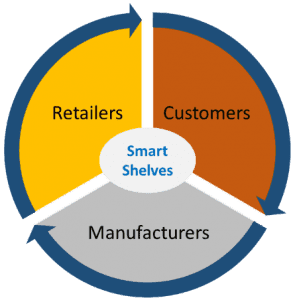 to optimize stock availability. Retailers can focus on providing customer-centric retail space to enhance customers in-store shopping experience. Manufacturers get closer to customers by gaining more visibility, thus enabling branding.
to optimize stock availability. Retailers can focus on providing customer-centric retail space to enhance customers in-store shopping experience. Manufacturers get closer to customers by gaining more visibility, thus enabling branding.
The store shelves are equipped with weight sensors, proximity sensors, 3D cameras, microphones, RFID tags, NFC, electronic printed tags, LED sensors, optical sensors, IOT sensors, etc., to monitor the shelf stock. When the customer picks an item from the shelf, product levels get low, Smart Shelves send a refill notification to employees/ store keepers on their connected mobile device. The stock is replenished by the store keepers.
New Technologies/ Innovations
ELECTRONIC SHELF LABELS (ESLs): This is a next-generation solution available for managing the retail stores. It displays information in real time using electronic/digital paper and display instead of printing product information and price on paper. A communication network allows the price display to be manually controlled or automatically updated at the business’ discretion. The wireless communication is based on infrared, radio or even visible light. The QR code which is presented on the electronic shelf labels connects the offline products with the online products. Combined with the shelf management solution, stores could execute promotions in a timely manner and have more interactions with customers.
PERSONALIZED ADVERTISEMENTS: Smart shelves have the ability to interact with apps on a customer’s smartphone. Sensors installed in the shelves can sense the customers approach them and can they can show a deal, for example, on the same product that was purchased during the previous visit. Additionally, if the customer uses a store’s app to create a shopping list, the smart shelves can interact with the list and show the customer where to find the items in the shelves. Although there are privacy and data collection concerns, it is expected that some consumers will share their personal information and purchase history to score a deal. Smart cameras can capture and identify customers’ gender and age within any pre-defined ranges. The system also records facial expressions, giving retailers a sense of customers’ moods as they watch ads, providing clues about which products they like or don’t like. Smart shelf technology uses beacons which are proximity-based communication devices that use low-energy Bluetooth technology to send personalized messages and promotions to shoppers’ smartphones.
IOT SENSORS: The Internet of things (IoT) is a network of connected devices embedded with electronics, software, sensors, actuators, and so on which enable these objects to collect and exchange data. Internet of things (IoT) sensors have many potentials uses in a supermarket, and one of the most basic is temperature control. The internet of things can also collect data from smart shelves and transmit the collected information to store staff for analysis. This technology can help supermarkets to assess which products appeal to consumers and can affect how stores arrange items on display. Using IoT technology, digital screens can display not only commercials and catalogs but also personalized promotions based on collected data.
5G TECHNOLOGY: 5G is the next (and fifth) generation of wireless technology systems. Shelves equipped with sensors could stock position of a product, ping a distribution center to restock its inventory, and also dynamically monitor the progress of that shipment. 5G also has the potential to create entirely new types of shopping experiences such as an augmented reality application that triggers when you enter a store and guides you directly to the shelf where you can find your product of interest.
RFID: A radio frequency identification reader (RFID) usually has a tag that contains a microchip, reader and antenna to transmit and receive data. The tags contain electronically-stored information. RFID tags uses smart barcodes and radio waves to identify items and transmit information about them. RFID enabled smart shelves have recently attracted enormous attention. RFID-enabled smart shelves ensure product placement in desired locations and enable data collection and delivery along the supply chain without human intervention. RFID tags can provide alerts to store associates whenever the shelves are empty and need restocking. RFID tags on every item combined with robotic checkouts can automatically scan your purchases and make shopping faster.
PRESSURE SENSOR FOILS: Pressure sensor foil that detects the changing of objects on a shelf could be used for a range of applications in retail, hotels and hospitals. Integrated into the sensor foil are active components, which include a multiplexer chip and a capacitive-to-digital converter, along with a number of passive components such as resistors and capacitors.

